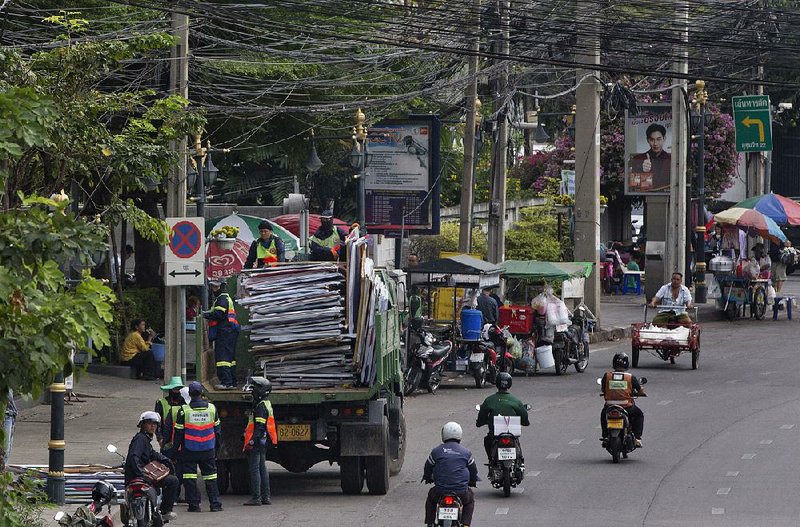Thai parties claim governing mandate
BANGKOK — Thai political parties led by one ousted from power in a military coup said Wednesday that they believed they won enough seats in the recent general election to form the next government.
The announcement came as concerns arose about potential irregularities in Sunday’s vote, the first since a 2014 coup, and before a full preliminary vote count has even been released. Official results aren’t due until May.
The leader of the Pheu Thai party, which headed the last elected government, and the leaders of five other parties held a news conference to say they believed they had won more than 250 seats in the 500-seat lower house. They said another small party also had agreed to join their potential government.
“Today, we hold the fact that parties on the side of democracy have received majority support from the people, although figures are not stable yet,” Pheu Thai’s Sudarat Keyuraphan said.
The Election Commission, appointed by the ruling junta’s hand-picked legislature, delayed the release of a full preliminary vote count on election night and then again on Monday. The commission has now said it will release its final preliminary results on Friday.
The incomplete results reported so far show Pheu Thai won the most seats, while the military-backed Palang Pracharath party appeared to have received the most votes. Both have said those results mean they have a mandate to form the next government.
EU vote backs ending of time switch
LONDON — The European Union has moved one step closer to scrapping seasonal time change after a majority of lawmakers voted to end the requirement to move clocks ahead by one hour in spring and then back in the fall.
Under the current law, which has been in place for member states for two decades, clocks are moved ahead one hour on the last Sunday in March to create daylight saving time, and then moved back to standard time on the last Sunday in October. The European Parliament voted 410-192 on Tuesday to back a draft law to abolish the twice-a-year switch.
Under the draft law, each of the 28 countries in the bloc (although Britain may have left by then) will have to choose before 2021 whether it will follow daylight saving time throughout the year or maintain standard time.
That may seem to be a recipe for confusion, but Violeta Bulc, European commissioner for mobility and transport, sought to allay concerns.
“I know from my discussions with member states so far that all of them see as clearly as we do the need for a coordinated approach,” she said during the debate.
Although the directive approved Tuesday by Parliament had initially suggested the practice would end this year, lawmakers amended the proposal to delay the switch for two years.
Yemen hospital struck; 7 civilians die
UNITED NATIONS — A hospital in a rural area of northwest Yemen was hit Tuesday by an airstrike, killing seven people and wounding eight others, Save the Children said.
The international aid organization, which supports the hospital, said in a statement that four of those killed were children and two adults are unaccounted for.
Save the Children said a missile struck a fuel station near the entrance to Kitaf rural hospital, about 62 miles from the city of Saada at 9:30 a.m. Tuesday.
The organization said the hospital had been open for half an hour and many patients and staff members were arriving on a busy morning.
Among the dead were a health worker and the worker’s two children and a security guard, it said.
Save the Children, which reported earlier this week that 37 Yemeni children a month had been killed or injured by foreign bombs in the past year, demanded an urgent investigation.
Helle Thorning-Schmidt, the organization’s chief executive, said: “We are shocked and appalled by this outrageous attack.”
India reports a low-orbit shoot-down
NEW DELHI — Prime Minister Narendra Modi of India announced Wednesday that India had shot down a low-orbit satellite with a missile in a test, hailing it as a major moment of national pride.
If confirmed, a successful missile test would put India in a small club of countries, including the United States, Russia and China, that have proved their ability to destroy targets in space. When China first successfully tested such a missile, in 2007, global concern arose over the growing weaponization of space.
“India stands tall as a space power!” Modi tweeted after his announcement. He added that the entire effort was “indigenous.”
Modi announced the news in a rare televised address to the nation, and many Indians were immediately suspicious that his primary objective was more political than technological.
In a little more than two weeks, India will begin holding an election — billed as the biggest in human history, with nearly 900 million registered voters — and Modi is up for re-election. Leaders in his political party have recently been heckled in public, and attendance has been poor at rallies for some of his allied candidates.
